Tours of Scotland since 1907
Here we have listed some of Scotlands’ most famous sons and daughters.
The son of a Helensburgh minister studied electrical engineering at Glasgow University. Unable to hold down conventional employment, he became a full-time inventor. In 1925 he transmitted the first television picture and later established the first TV station. Providing services to the BBC his company produced the first sight and sound broadcast and, subsequently, an outside broadcast of the 1931 Derby.
Barrie - Sir J M (1860-1937) - Author of "Peter Pan" and "The Admirable Crichton".
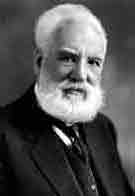
Born in Edinburgh and educated at Edinburgh University he emigrated to Canada in 1870 and the USA the following year. He became a Professor in Boston in the early 1870s and worked trying to develop a machine that would assist deaf people with their hearing. This research led him to develop the telephone which was patented just days before his rivals. The first call was made on 10 March 1876. The Bell Telephone Company has formed in 1877 making Bell a fortune from its work.
Brewster - Sir David (1781-1868) - Invented the kaleidoscope and the lenticular stereoscope.
The colourful cabinet-maker and city councillor presented a respectable image by day but had a secret night-time career as a housebreaker. Using his day-job as cover, he was able to copy keys and discover the security arrangements of his victims. He used his ill-gotten gains to finance his extensive gambling habit.
After a bungled raid in 1788, he fled to The Netherlands but was arrested and extradited back to Edinburgh where he faced trial and was found guilty. He was hanged at the Old Tolbooth in Edinburgh in front of a massive crowd.
Buchan - John (1875-1940) - Governor-General of Canada and the author of "The Thirty-Nine Steps" etc.
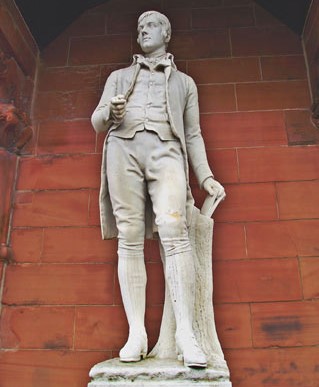
Robert Burns was born in Alloway in 1759 and was the oldest of seven children. As he grew up, Burns began to take an interest in folk tales and songs. By 1786 he had inherited the family farm and was in financial difficulties. To raise funds a book, “Poems, Chiefly in the Scottish Dialect”, was published which was critically acclaimed. He moved to Edinburgh, where he became famous as the “Ploughman Poet” and toured the country giving recitals. In 1789 Burns moved to Dumfries to become an exciseman. It was here that he died, aged just 37 years old.
In his short life, Robert Burns penned beautiful love songs including “Ae Fond Kiss”, “A Red, Red Rose” while “A Man’s a Man for A’ That” exemplifies his interest in humanity. His most famous song is undoubtedly “For Auld Lang Syne” which has been sung throughout the World at New Year for over two centuries
In celebration of his life and work, Burns Suppers take place throughout Scotland and beyond on the date of his birth, 25 January.
Burrell - Sir William (1861-1958) - A wealthy shipping magnate who gave his art collection to Glasgow.
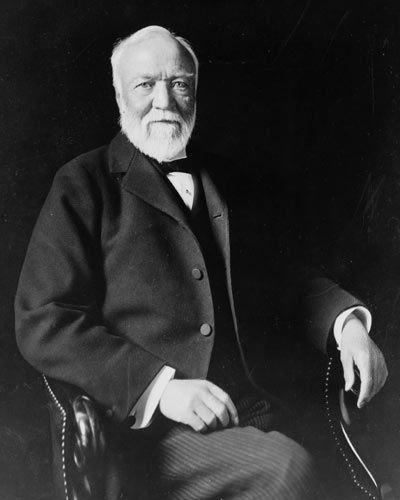
This rags to riches story starts in Dunfermline in 1835 when Andrew Carnegie was born, the son of a linen weaver. In 1848 the family moved to the USA, and Carnegie joined the Pennsylvania Railroad as a clerk. He rose to gain a top position within the company during its expansion, particularly during the Civil War and became a millionaire by the time he was 30.
As well as the railway he invested in steel and iron, and by the 1800’s he was the undisputed leader in these industries. By 1900 Carnegie had decided he should stop earning money and start spending for the benefit of others. He is famous for the chain of 2,500 public libraries he created throughout Britain and the USA. He also donated to the four ancient Scottish Universities, despite not having a formal education, and to his hometown of Dunfermline.
By the time of his death in 1919, it is thought he gave away over $350 million.
Scotland’s favourite James Bond? Most likely! Thomas Sean Connery was born in Edinburgh in 1930 and had a wide range of jobs including milkman, coffin polisher and lifeguard. After moving to London, he had his break in 1962 when he was cast as secret agent James Bond in “Dr No”. Connery starred in a total of seven James Bond films as well as many other movies including “Murder on the Orient Express” and “Indiana Jones and the Last Crusade”.
Connolly - Billy (1942 - ) - The shipyard worker who became an international actor and comedian.
Cranston - Kate (1850-1934) - An entrepreneur who encouraged the artistic talents of Charles Rennie Mackintosh.
This successful industrialist used his sense of social responsibility to establish, New Lanark village in 1786. The flowing waters of the Falls of Clyde powered the mills which, at its peak employed over 1,300 workers. Dale was known as a compassionate employer who provided housing, schools and welfare facilities for his staff.
UNESCO has recognised New Lanark as a World Heritage Site. Learn more by following this link: https://whc.unesco.org/en/list/429/
Dewar - Donald (1937-2000) - Architect of the new Scottish Parliament and its first First Minister.
Dewar - Sir James (1842-1923) - Inventor of the vacuum flask.
Douglas - David (1799-1834) - Botanist and explorer after whom the Douglas fir is named.
Doyle - Sir Arthur Conan (1859-1930) - Based his famous detective Sherlock Holmes on a forensic scientist.
Ferguson - Sir Alex (1942 - ) - A football manager who has made two different teams European Champions.
Fleming - Sir Alexander (1881-1955) - Won the Nobel prize as the discoverer of penicillin.
Greyfriars Bobby (1855-1872) - A loyal Skye Terrier who stood guard over his masters grave for 14 years.
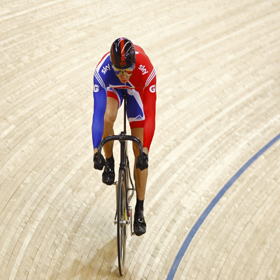
Born in Edinburgh Chris Hoy was inspired to cycle by the bicycle scene in the 1982 movie “ET”. He is Scotland’s most successful Olympian having won three gold medals at the Bejing Olympic Games in 2008. The Velodrome at the Emirates Arena in Glasgow is named in his honour.
Kidd - Captain William (1645-1701) - The treasure of this famous pirate, hanged in 1701, has never been found.
Knox - John (1513-1572) - Leader of the Reformation of the church in Scotland.
Lauder - Sir Harry (1870-1950) - Entertainer and songwriter whose caricatures influenced Scotland's tartan image.
Liddell - Eric Henry (1902-1945) - A great athlete, he became the subject of the film "Chariot's of Fire".
Lister - Lord Joseph (1827-1912) - Pioneer of modern surgery and antiseptics.
Livingstone - Dr David (1813-1873) - African missionary and explorer.
Lyon - Elizabeth Bowes (1900-2002) - Queen Elizabeth the Queen Mother,
McAdam - John Loudon (1756-1836) - Improved a tar-based road surface which became known as "tarmac".
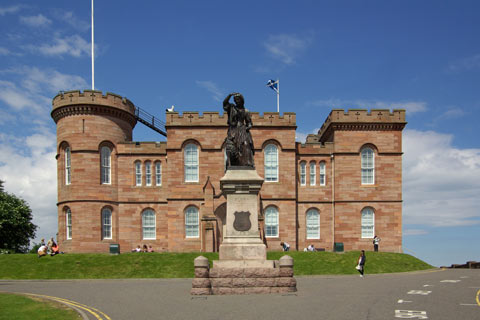
Born on the Hebridean island of South Uist in 1725 she famously sailed Bonnie Prince Charlie from Benbecula “over the sea to Skye” dressed as her maid, Betty Burke. The Prince was a fugitive after the Battle of Culloden in 1746 and had a bounty of £30,000 on his head.
After his successful escape, MacDonald was subsequently arrested and detained in the Tower of London. On her release, she married and emigrated to North Carolina. The family later returned to Scotland and lived quietly until her death in 1790. She is buried on the Isle of Skye wrapped in a sheet on which Bonnie Prince Charlie had slept.
Discover more about the Jacobites by following this link: https://www.nts.org.uk/what-we-do/history/jacobites
McGonagall - William (1830-1902) - Considered by many to be the "worst poet in the world".
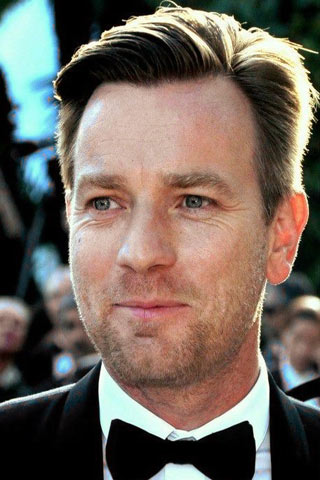
This Holywood A-list actor was born in Perth and grew up in Crieff. After a number of TV roles, he made his film debut in “Being Human”. He gained international fame after playing the heroin addict, Mark Renton, in “Trainspotting”, a role he reprised in the 2017 sequel, “T2 Trainspotting”.
Other notable roles during his career include playing the young Obi-Wan Kenobi in the “Star Wars” prequel trilogy; the young poet, Christian in “Moulin Rouge” and Sky Masterson in a London revival of “Guys and Dolls”.
MacGregor - Rob Roy (1671-1734) - The larger than life Highland Rogue.
Macintosh - Charles (1766-1843) - His invention of waterproof clothing added his name to the English dictionary.
Mackenzie - Sir Compton (1883-1972) - Author of books such as "Whisky Galore" and a staunch nationalist.
Macquarrie - Lachlan (1762-1824) - "Father of Australia".
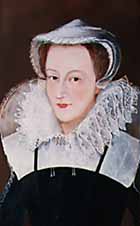
One of Scotland’s most romantic figures Mary was born at Linlithgow Palace in 1542 and became Queen when she was just six days old and crowned a few months later. She spent her early years in France where she married the Dauphin of France in1558. On the death of the French King in 1560 she returned to Scotland where she found herself the victim of opposing factions trying to use her patronage for their own ends.
Follow this link for the full story of Mary, Queen of Scots tragic life: https://www.royal.uk/mary-queen-scots-r1542-1567
Muir - John (1834-1914) - One of the founders of United States Conservation.
Born in Glasgow in 1987 Andy played his first competitive tournament at five years of age. After moving to Dunblane he pursued his tennis career turning professional in 2005. He won a gold medal at the London Olympic Games in 2012 and the Wimbledon Championship the following year - the first Scot to do so since 1896. In 2016 he repeated his success at the Wimbledon Championships and won a further two Olympic gold medals at the Rio Games.
Paterson - William (1658-1719) - Founder of the Bank of England and organiser of the ill-fated Darien Scheme.
Pinkerton - Allan (1819-1884) - Founded the Pinkerton Detective Agency in Chicago in 1850.
Raeburn - Sir Henry (1756-1823) - One of Scotland's most famous portrait painters.
Ramsay - Allan Jnr (1713-1784) - Accomplished portrait painter of the rich and famous.
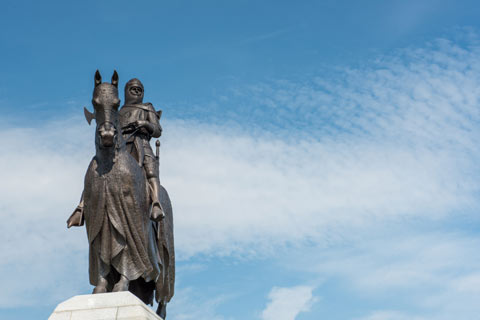
One of Scotland’s greatest freedom fighters Bruce became King in 1306 which incurred thewrath of King Edward I of England who forced him into hiding. While sheltering in a cave,he watched a spider struggling again and again to build a web. Inspired by the spider's efforts Bruce started a guerrilla campaign to gain Scotland’s independence.
In 1314 his army met the much stronger English forces of King Edward II at Bannockburn.The Scots were victorious, and the country’s independence was secured. Bruce reigned as King of Scotland until his death in 1329. He is buried at Dunfermline Abbey, and his heart is interred at Melrose Abbey.
Rowling - J. K. (1965 - ) - The author of the "Harry Potter" books has made Scotland her adopted home.
St Columba (521 - 597) - His abbey on Iona has had an influence on Scotland for over 1400 years.
St Kentigern/St Mungo (520-612) - Patron Saint of Glasgow.
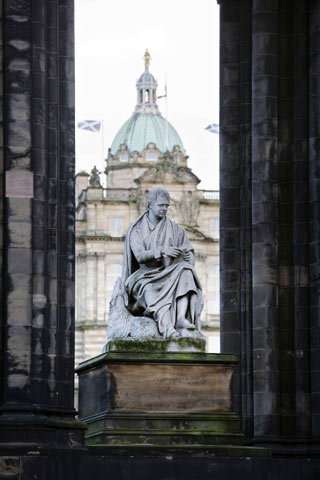
Born in Edinburgh Sir Walter Scott was the ninth child of a lawyer. After studying at Edinburgh University, he left to pursue a legal career but was also an enthusiastic poet and author. Through his work and hobby, he amassed enough money to buy his home on the banks of the River Tweed, Abbotsford.
He published the Waverley series of novels in the 1820s which started the Scottish tourism industry as readers flocked to see the places that Scott described so eloquently in his books. In 1822 Scott was mostly responsible for making the arrangements for King George IV’s visit to Scotland which signalled the restoration of Tartan as Highland wear as it was banned after the 1746 Jacobite uprising. Sir Walter Scott died in 1832 and is buried at Dryburgh Abbey.
Simpson - Sir James Y (1811-1870) - Pioneer of the medical use of chloroform.
Smith - Adam (1723-1790) - Wrote the first "modern" book on economics, advocating free trade to increase wealth.
Smollet - Tobias George (1721- 1771) - Regarded as a founder of the modern novel.
Stein - Jock (1922 - 1985) - One of the most successful football managers ever produced in Scotland.
Stevenson - Robert Louis (1850-1894) - Author of such classics as "Treasure Island" and "Dr Jekyll and Mr Hyde".
Stewart - Sir Jackie (1939 - ) - Formula 1 Racing World Champion in 1969, 1971 and 1973.
Telford - Thomas (1757-1834) - The "Colossus of Roads" earned a reputation as the finest civil engineer of his day.
Thomson - Alexander "Greek" (1817-1875) - Architect whose admiration for Grecian forms became a trademark.
Tranter - Nigel (1909-2000) - A celebrated novelist who revived interest in Scottish history.
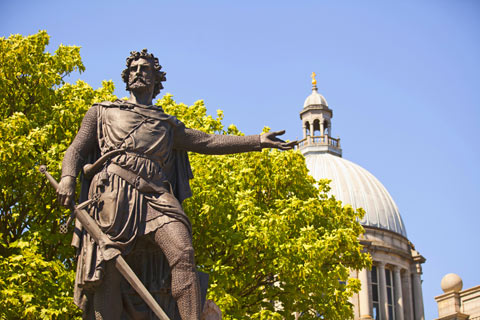
One of Scotland’s most celebrated patriots, he led his army to a famous victory at the Battle of Stirling Bridge in 1297. He became Guardian of Scotland and mounted raids on Northern England, capturing Berwick. His success encouraged many of his countrymen to the independence cause. The following year he met the English forces at Falkirk but was defeated this time.
Wallace fled to France to try to gain support from the French King, but on his return, he was betrayed and captured. After a show trial, Wallace suffered a barbaric execution. Click on this link to discover more about William Wallace.
Watt - James (1736-1819) - His development of the steam engine was the springboard for the Industrial Revolution.
Quality Sightseeing since 1907
For over 100 years we've been making touring Scotland a quality experience for visitors from all over the World. Over the years our Scottish tours have been chosen by many thousands of travellers who want to tour Scotland in comfort and style.
Scottish Tours has a long and distinguished pedigree and we are proud to include the famed names of Scottish Motor Traction, Scottish Omnibuses and Eastern Scottish as part of our heritage. For more information on our history click here
Today we continue to offer our clients the highest standards of service and the very best value. You can tour Scotland with Scottish Tours confident in the knowledge that no one has more experience.
Tour Scotland with Scottish Tours. Discover the highlights of Scotland on a tour to Loch Ness, The Scottish Highlands, Skye and Loch Lomond.